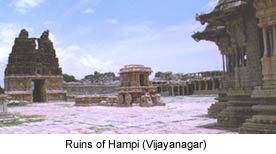

 |  |
 Vijayanagar Empire was one of the last great kingdoms of India's medieval period. The empire was born out of the political turmoil that followed Turkish and Afghan invasions in the early 1300's. It lasted for more than 300 years and controlled much of the south of the subcontinent's peninsula. After a long period of decline, it effectively ended in the 1640's.
Vijayanagar Empire was one of the last great kingdoms of India's medieval period. The empire was born out of the political turmoil that followed Turkish and Afghan invasions in the early 1300's. It lasted for more than 300 years and controlled much of the south of the subcontinent's peninsula. After a long period of decline, it effectively ended in the 1640's.
Two brothers, Harihara and Bukka, founded the Vijayanagar kingdom. They were officials of the kingdom of Kampili, which fell to the armies of the sultan of Delhi in 1327. The brothers were taken to Delhi, converted to Islam, and then sent back to govern Kampili for their new masters. But the brothers proclaimed their independence from Delhi, and reverted to Hinduism. In 1336, they set up a new capital, Vijayanagar (City of Victory), under Harihara. In 1343, Bukka conquered and annexed the neighbouring kingdom of the Hoysala Ballala. This gave Vijayanagar control of the peninsula from coast to coast. But in 1347, the Bahmani sultanate established itself on Harihara's northern border and posed an enduring threat. Bukka succeeded his brother in 1356, and became Bukka I. He attempted to deal with the threat from the Bahmani sultanate. In costly wars, he succeeded only in stabilizing the boundary between the two states at the Krishna River. But he did absorb a newly established sultanate, Ma'bar (Madura), in 1370. Harihara II, who reigned from 1377 to 1404, attempted to reinforce central authority by removing his cousins, who were provincial governors, and replacing them with his sons. The assassination of the Sultan of Bahmani in 1378 gave Harihara the chance to capture Goa and other west coast ports. A Bahmani counterattack in 1388 and 1389 led to a siege of Vijayanagar and the slaughter of many of its citizens. Harihara fended off further damage by making alliances with the sultans of Malawa and Gujarat. After Harihara II's death in 1404, his three sons fought each other for the throne. The survivor, Devaraya, became king in 1406. He also confronted the Bahmanis. This led to another siege of the capital and the loss of part of the disputed kingdom of Kondavidu in 1420. Devaraya realized that his rivals had a superior army and decided to reform his own forces by recruiting Turkish archers and importing fine horses from the Middle East. continued.... next page >> |
Copyright ©2000 indiansaga.info. All rights reserved.
By using this service, you accept that you won't copy or use the data given in this website for any commercial purpose.
The material on indiansaga.info is for informational & educational purpose only.
This site is best viewed at 800 X 600 picture resolution.